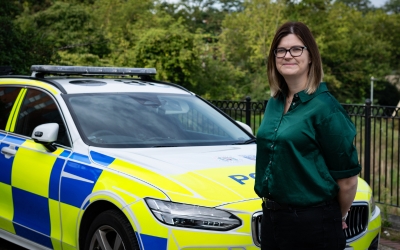Meet Detective Nic Jury
 Six years ago, the teamwork showcased by police officers carrying out their work inspired Nic Jury to join the police service. Now, as a Detective Constable at Thames Valley Police, we spoke with Nic about her career in policing, and how she is feeling supported by the force as a constable with ADHD.
Six years ago, the teamwork showcased by police officers carrying out their work inspired Nic Jury to join the police service. Now, as a Detective Constable at Thames Valley Police, we spoke with Nic about her career in policing, and how she is feeling supported by the force as a constable with ADHD.
Current Role: Detective Constable in CID, Reading
Age at joining: 27
Length of Service: 6 years
What attracted you to policing? The challenge of doing something new and the variety of opportunities available. Policing is unlike any career I’ve had previously and the number of avenues available to an officer made it really appealing. I’d been working closely with some local police officers in my previous job, and they would tell me about some of the work they would do, along with the team mind-set, and I decided I wanted to be a part of that.
How has your career in policing progressed so far? It’s been quite a journey! I spent time in uniform as part of an Incident and Crime Response team (ICR), but this was quite challenging to manage due to my ADHD. I then spent a short amount of time working with the performance improvement team before moving to CID (Crime Investigation Department) where I’ve been for the last two and a half years.
I was recently accepted onto the Police Now Frontline Leadership Programme with a view to being promoted to Sergeant in the future and have also been able to undertake project work looking at neurodiversity – specifically ADHD – along with becoming an assessor for the Workplace Needs team.
What motivated you to become a Detective? Being a Detective was always my career goal – the complexity of protracted cases and the types of crime that the CID manages had always interested me. I liked the idea of being part of a team that works closely together on larger scale jobs and being given an opportunity to engage in further training to develop my skills.
Have you felt supported during your career development? I’ve learnt that neurodiversity is not a barrier to being a detective. I have been incredibly well supported by my line managers and we’ve navigated my ADHD together. It has been a real learning experience – utilising the strengths of my ADHD and identifying ways to effectively manage the challenges. There are regular opportunities to have one to ones for feedback and discuss career goals; the tasks we get involved in can sometimes be customised to ensure everyone is getting what they need to progress along the career path they are aiming for.
What would a typical day look like for you as a detective? We deal with a range of crimes including serious sexual assaults, attempted murder, GBH (Grievous Bodily Harm), child sex offences, modern slavery, and firearms related jobs.
We also often work across different departments and specialisms, utilising skills and knowledge to ensure we’re completing thorough investigations and achieving the best possible outcomes for victims. No day is ever the same, but we support each other, and someone usually ends up learning something new! The diverse nature of the role and the people we come into contact with is what keeps the job interesting.
What’s it like to work in CID compared to other departments/teams? I like the variety of CID, we cover a wide range of crimes and the complexity of them means that there is a real attention to detail required which I enjoy. Some of our reports are more challenging where we don’t have suspects or witnesses, and I like having to piece everything together to work out what has happened.
What makes a great Detective? Someone who is compassionate, organised, patient, and has attention to detail. We are here to support and bring justice for victims (or families of victims) who have experienced one of the worst moments of their lives. Furthermore, we manage protracted investigations with a vast amount of material and potential lines of enquiry, which can generate a lot of paperwork – we rarely have all the information from the start, so it is important to pay attention to the small details as it can make a huge difference.
What would you say to someone considering becoming a Detective? That they should definitely apply! The role is so varied and there are so many opportunities available. You’re recognised for the strengths and differences you bring, and I can definitely say that the neurodiversity I bring to the role has been valued and makes the team stronger as a whole. I’ve had feedback from victims, witnesses, and suspects who have found communicating with me easier because of my understanding of neurodiversity.
–
Feeling inspired and want to learn more about working as a Detective? Visit our Detective Constable page today. Our Detective programme could be for you.


 Facebook
Facebook
 Twitter
Twitter
 Linkedin
Linkedin
 Instagram
Instagram